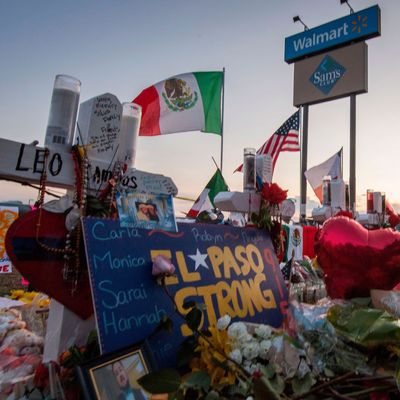
Patrick Crusius, the 21-year-old Texan who confessed to driving ten hours from Allen to El Paso and killing 22 people at a Walmart last August, is facing federal hate-crime charges, according to the Washington Post. The total of 90 counts, which officials announced on Thursday, stem from Crusius’s disclosure that he was targeting Hispanic people. The manifesto he wrote beforehand alluded to a purported “Hispanic invasion of Texas,” which he was trying to offset by frightening Hispanic residents into leaving the United States and deterring would-be migrants from coming. He chose El Paso, in part, because its unusually large share of Hispanic denizens — 82 percent of the population — raised the likelihood that he’d kill several by opening fire in a public place. True to his aim, his eventual victims were overwhelmingly Hispanic and included seven Mexican nationals.
There’s reason to believe that this development means Crusius will soon face the federal death penalty. The precedent is so aligned. Dylann Roof, who killed nine black worshippers at a South Carolina church in 2015, was sentenced to die under an Obama Department of Justice amid an unofficial moratorium on federal executions. Trump and Attorney General William Barr have since resumed actively killing federal death row prisoners, and the Trump administration has even entertained plans to expedite executions for people convicted of mass murder. If Obama’s then-attorney general Loretta Lynch could pursue death for Roof under the prevailing circumstances — which included a widely applauded display of grace and forgiveness toward the killer from family members of the deceased — it’s hard to imagine Trump and Barr choosing mercy. Meanwhile, prosecutors in El Paso have already charged the 21-year-old with capital murder and said they’ll ask that he be sentenced to death. Only time will tell. But Crusius’s seems to be running out.
Just as the Obama DOJ’s decision betrayed the values of grace and forgiveness that his administration claimed to celebrate in Roof’s victims, the likelihood of a Barr-initiated death sentence for Crusius would be another vapid gesture of cruelty from an administration overflowing with them. Shortly after the El Paso killings, Trump promised to stem gun violence by partnering with Democrats to implement “strong background checks” — on the tacit condition that they be paired with “desperately needed immigration reform,” which has been a centerpiece of his campaign and presidency. He’s since abandoned the former pursuit, which was predictable. But the initial gesture nevertheless encapsulates why killing Crusius would betray an unseriousness toward undermining the very forces that produced him — not to mention striking commonalities between the killer’s goals and Trump’s own. Functionally, the president committed to impeding men like Crusius’s ability to use guns as a means of keeping Hispanic immigrants out of the U.S., as long as Democrats enable him to better advance Crusius’s stated goal of keeping Hispanic immigrants out of the U.S.
The president has only followed through on one of those commitments so far. Due to his policies, it’s now more difficult than perhaps ever before to immigrate to the U.S. from Mexico or Central America and as easy as ever to buy an assault rifle, even as right-wing displays of paranoia around the specter of being disarmed have rarely been more visible or encouraged more by a sitting president. In such an environment, the primary purpose of killing Crusius — whether it’s done by the state of Texas or the federal government — would not be to secure justice for the dead, but to affirm the right to mete out violence and death for a government that’s rarely had qualms about either. Promises of violent retribution have long shielded officials in the U.S. from the more complicated work of fixing the root causes of crime and violence. They’re used more commonly as a catchall with no clear endgame save for fleeting catharsis. Draconian punishment for Crusius wouldn’t even deter others from following in his footsteps. So as officials weigh such a punishment for the El Paso shooter, it’s worth considering which of the following opting for his execution would advance: Peace for his victims and their families and the prevention of such suffering in the future; or the roiling bloodlust of a government that has few problems killing in the name of brutal anti-bigotry but no real interest — in fact, quite the contrary — in actually bringing it about.






























